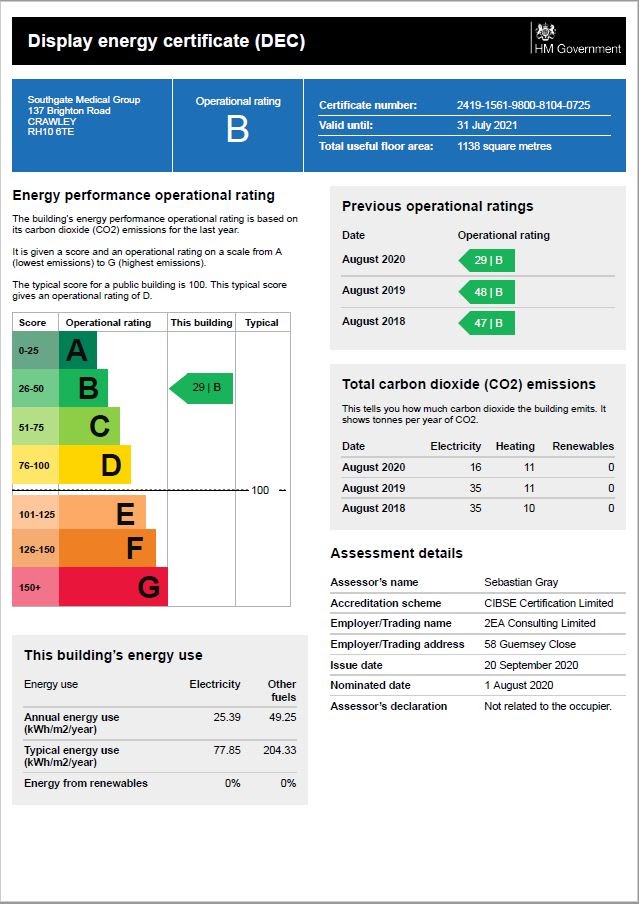A Report On: Display Energy Certificates

What do Display Energy Certificates (DECs) really represent in 2020?
 Display Energy Certificates, or DEC’s for short, were introduced by the Department for Communities and Local Government in 2008. They form part of the implementation of the European Directives 2002/91/EC and 2010/31/EU on the energy performance of buildings.
Display Energy Certificates, or DEC’s for short, were introduced by the Department for Communities and Local Government in 2008. They form part of the implementation of the European Directives 2002/91/EC and 2010/31/EU on the energy performance of buildings.
“The purpose of introducing DECs is to raise public awareness of energy use and to inform visitors to public buildings about the energy use of a building” – A guide to Display Energy Certificates and advisory reports for public buildings, 2012, Department for Communities and Local Government.
A DEC provides a building with a rating from A-G that is benchmarked against all other buildings of that type within the UK. This rating is based on operational performance and uses actual energy consumption data over a twelve-month period.
Factors that can affect a buildings’ DEC rating are the total size of the building in terms of gross internal area (GIA), its operating hours, processes carried out within the building, energy consumption and degree days data.
DEC’s are mandatory for the public sector where a building is greater than 250m2 and is accessible to the public. An Advisory Report must accompany a DEC; this report contains information on the building, its operation and lists all the energy-saving recommendations identified by the DEC assessor.
Currently, in the private sector, these are voluntary; but many companies and building owners use DEC to provide an annual assessment of how well their building is performing at an operational level. This also provides an opportunity to have an energy audit and identify potential financial savings.
DEC’s can also be used in the private sector as a route to legislative compliance with the Energy Saving Opportunity Scheme, which came into effect in 2014/2015.

To produce a DEC, you must have a qualified DEC assessor undertake the work. They will be accredited with a professional body, listed on the approved register of assessors and conducts yearly CPD to ensure they stay up to date with the requirements.
As a DEC assessor, their work will be regularly checked and submitted for quality assurance assessment by the professional body. 2EA Consulting Limited have two qualified and certified DEC assessors registered with the Chartered Institution of Building Services Engineers.
The DEC is submitted through a centralised database and the rating calculated using the government-approved operational methodology. There are over 25 main benchmarks, ranging from hospitals to hotels and leisure centres to university campuses, with further subcategories to give the most accurate rating possible.
Once a DEC is produced, it needs to be displayed in a prominent place viewable by the public. The certificate needs to be in A3 colour format and its validity is dependent upon the building size. For buildings over 1,000m2, the DEC is valid for twelve months; if the building is under 1,000m2, then it is valid for a period of 10 years.
However, the building occupier can opt to renew early as this provides more accurate reporting on the buildings’ performance. The Advisory Report is valid for 7 years and 10 years respectively and does not need to be publicly displayed.
This is where the question: What do they really represent in 2020? Is really answered.
What do (DECs) really represent in 2020?
The DEC provides the buildings’ occupiers and visitors the opportunity to see how that building is performing against a recognised benchmark. It engages them to be more energy conscious and encourages them to reduce energy consumption. The Advisory Report details recommendations that can cut energy costs, whether by installing a new boiler or implementing additional staff training.
The DEC assessors job is not just to audit the building and identify savings, but to engage with staff and promote best practice in energy conservation. So, a Display Energy Certificate can be more than just a legislative requirement, but an opportunity to improve a buildings’ performance, reduce energy costs, engage with staff and make everyone more energy conscious; something that is very important in today’s world.


